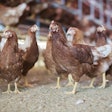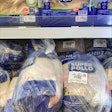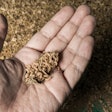
The first phase of an ongoing study to discover U.K. farmers’ attitudes to cultured meat is now complete.
The findings have been mixed, with some seeing advances in cell-based meat production as potential competition to traditional meat production, while others have suggested that cell-based meat could lead to premiums for meat from traditionally raised meat.
Cultured Meat & Farmers is a two-year study looking at farmers’ attitudes to cell-based meat, the potential opportunities and risk, and how, if production is scaled up, it could affect U.K. agriculture.
The project brings together farmers from a wide range of sectors, food businesses and companies, charities, the government, and academics from both the U.K. and U.S., its first findings have now been published in the journal Frontiers of Sustainable Food Systems.
Threats and uncertainty
Among threats identified were the potential effects on health, and where cell-based meat might be positioned in the market.
Would it compete with chicken breast or chicken nuggets, steak or ground beef, farmers asked. They also questioned whether we really have enough information to thoroughly understand the new technology.
Opportunities for the real stuff
Not all farmers, however, saw the technology as negative, and It has been argued that cultured meat production could take the pressure off intensive livestock production, creating opportunities for higher-welfare, higher priced, extensive traditional livestock products.
One extensive lamb and beef producer thought that marketing their product as “the real stuff” could offer a competitive advantage compared to protein produced in a bioreactor. Others could imagine new markets where farms supply plant or animal based raw material for the process.
The researchers argue that, within the discourse on cultured meat, farmers voices are often lost and that while their study is not representative of all UK farming, the study is engaging farmer perspectives as a way of starting a meaningful process of greater stakeholder inclusion in cultured meat innovation pathways.
Environmental arguments
Cultured meat is estimated to require less than poultry production (66%) and cattle production (66%), as well as need less water (poultry 92%, cattle 98%), and could benefit food security, the environment and food security.
However, farmers are not, necessarily, convinced by these arguments.
One expressed a concern that cultured meat would be produced in factories demanding huge amounts of energy and other likely inputs, and would then be marketed as a green product, which it is highly likely not to be.
Another had different reservations stating: “I think the biggest disconnect that most people don’t understand is that the fertility of the soil comes out the back of an animal, but if you don’t want that animal you can’t have it in terms of the soil, so you’re going to degrade the soil… animals are good for the land”.
The research team will now partner with nine case study farms across the U.K representing a wide range of farming systems. Together, they will explore how each farm could respond to cell-based meat, for example, how it could best compete, or how it could supply ingredients, or even produce cultured meat on farm.
















